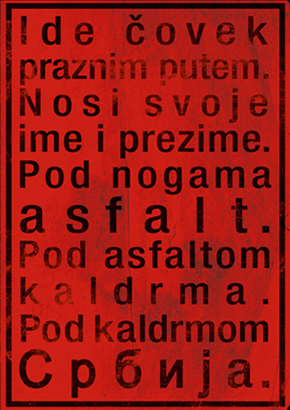 Serbia, which wants to be part of Europe, should treasure people like Sreten Ugricic. This I know from first-hand experience, as an insider, because I was chair of the National Library of Serbia’s Board of Directors during the first four years of Ugricic’s mandate (2001-2005). I have seen Ugricic, “the state official”, at work and I was impressed by his knowledge, patience and enthusiasm which he displayed day in day out, trying to turn this institution into what it is today. And today the National Library is one of the precious few institutions in Serbia which have implemented European standards and joined Europe, without waiting for our supposedly pro-European political parties to seriously head in that direction.
Serbia, which wants to be part of Europe, should treasure people like Sreten Ugricic. This I know from first-hand experience, as an insider, because I was chair of the National Library of Serbia’s Board of Directors during the first four years of Ugricic’s mandate (2001-2005). I have seen Ugricic, “the state official”, at work and I was impressed by his knowledge, patience and enthusiasm which he displayed day in day out, trying to turn this institution into what it is today. And today the National Library is one of the precious few institutions in Serbia which have implemented European standards and joined Europe, without waiting for our supposedly pro-European political parties to seriously head in that direction.
Unfortunately, the Serbian government doesn’t feel the same way. Without much hesitation, they removed Ugricic, penalizing him for a supposedly inexcusable error, just because he, along with many other writers, stood in solidarity with his Montenegrin colleague, who was declared a terrorist by the tabloid press, which spread moral panic and hysteria, dragging us back to the 1990’s, when the tabloids used to do this sort of thing mainly at the behest of Milosevic’s Socialist Party. By making this decision, the government did not acknowledge the only competent opinion in this matter, that of Minister for Culture Markovic, who made the reasonable argument saying this should not be rushed. This leaves us with the impression that the removal of “state official Ugricic” was long-coveted, that to most ministers – not just to Ivica Dacic – he simply gave an excuse, and not only that they couldn’t wait for the right opportunity to be “horrified” by his actions – they were delighted when it came.
The worst thing in all this is that it turns out the government did not sack Ugricic this quickly, shaking its head in disbelief, because it was unaware of the brilliant job this man had done for Serbia and its European aspirations. On the contrary, as far as we can tell, Ugricic’s sin – which earned him such a draconian punishment from this government that pretends the real reason is his inappropriate signature – must be exactly his contribution to building a European Serbia. I believe that the local political elites find it especially suspicious that he is doing this seriously, in the right way, by promoting European values in our culture, both as head of the National Library and as a writer. He is suspicious because he is not one of those who go on and on like broken records that they would like to join Europe, but slowly, steadily, protecting their asses, pardon me, protecting our valuable identity, which as we all know is heart-shaped and is in Kosovo. “State officials” of this sort are still undesirable. It is a miracle that Sreten Ugricic managed to be the managing director of the National Library for a full ten years. Today it is obvious that during this time he made so many enemies in the government that he should be lucky not to be thrown in prison.
Peščanik.net, 25.01.2012.
- Biografija
- Latest Posts


